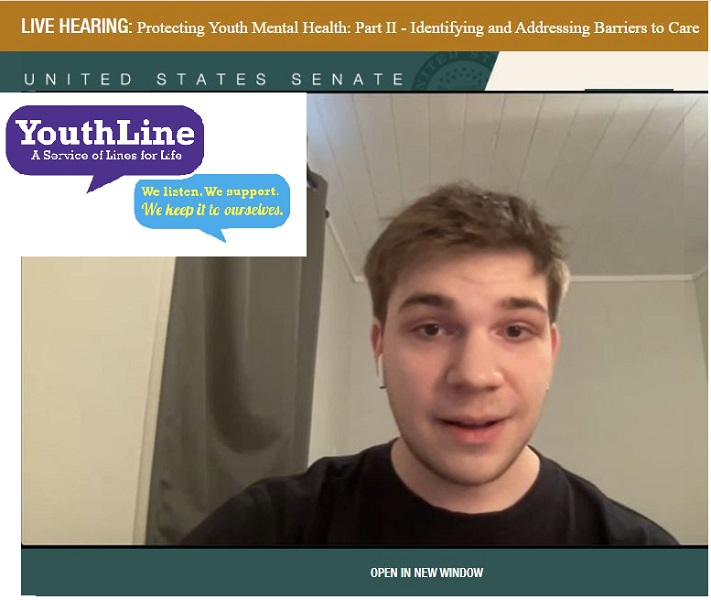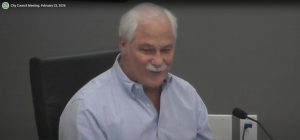La Pine volunteer speaks from front lines of youth mental health crisis
4 min read
LaPine YouthLine volunteer Trace Terrell testified before the U.S. Senate Finance Committee on the youth mental health crisis.
Speaking on the youth mental health crisis to the Senate Finance Committee last week, the Surgeon General of the United States:
[00:00:08] Surgeon-General Dr. Vivek H. Murthy: Many mental health challenges first emerge early in life and study suggests that the average delay between the onset of mental health symptoms and treatment is 11 years. Eleven long confusing, isolating, and painful years.
[00:00:24] John Q: At a follow-up hearing on Feb. 15:
[00:00:31] Sen. Ron Wyden: In the Surgeon General’s words, 11 long confusing, isolating and painful years. … More than anything, it says that America’s approach to mental health care is way out of whack and it starts failing America’s young people early on.
[00:00:54] John Q: He said we need to provide earlier treatment, and provide more resources to schools and communities,
[00:01:00] Sen. Ron Wyden: We get told again and again, that school counselors are overwhelmed, community-based programs are too few, and referrals are inconsistent. Mental health care simply doesn’t start early enough. And it’s not reaching young people where they are, especially kids in rural areas….
[00:01:22] The pandemic has driven a shocking increase in self-harm among young people. Suicide attempts among young teen girls resulting in hospitalizations recently jumped more than 50 percent.
[00:01:36] John Q: The first speaker was a volunteer for “Youth Line”, a free confidential teen crisis helpline.
[00:01:42] Trace Terrell: My name is Trace Terrell. I use he/him pronouns and I’m a 17-year-old from LaPine, Oregon. Before I share more about myself, I would first like to tell you some things I’ve heard from teens across the country.
[00:01:52] 4:07 PM. I just need someone to talk to.
[00:01:56] 4:37 PM. My dad hit me, but you can’t call it the cops.
[00:02:01] 5:23 PM. I need therapy, but my family can’t afford it.
[00:02:05] 8:07 PM. I just lost my dad and I can’t stop crying.
[00:02:10] 6:42. I want to kill myself.
[00:02:14] These are just some examples of the many conversations that I respond to as a volunteer with YouthLine, a free confidential teen-to-teen crisis helps support hotline located in Oregon, where they’re helping someone navigate complicated feelings about their sexuality or working with others to develop comprehensive safety plans, I spend three and a half hours every week responding to a variety of mental health challenges experienced by teens across the country with an emphasis on the fact that no problem is ever too big or too small.
[00:02:40] I became involved with youth line during my freshman year of high school, as someone who struggled with depression, suicidal ideation, eating disorder, behavior and anxiety throughout middle and early high school. I, for the longest time, believed that no one could relate to my experiences. However, as I became more involved, I realized that my challenges were a microcosm of public health issues that affected hundreds of thousands of teens across the country.
[00:03:04] As more and more teams start to have conversations about mental health and engage in help-seeking behaviors, the need for expansive and intersectional mental health efforts has never been so needed.
[00:03:13] John Q: Trace recommended providing mental health services and education in schools.
[00:03:18] Trace Terrell: We need a comprehensive and standardized mental health curriculum. All students should learn about engaging in real-world, help-seeking behaviors, developing systems of self-care and supporting our friends with mental health struggles, because statistics show that we turn to each other before anyone else.
[00:03:32] We must also create a streamlined approach to pre-mental health screenings and referrals. At my school, four of every five referrals to external resources are not carried out. Let that sink in. Eighty percent of referrals go nowhere. Someone who needs help should receive help.
[00:03:47] John Q: Trace identified common barriers, including transportation.
[00:03:51] Trace Terrell: My friends have struggled to receive professional mental health services because it’s too expensive for their families too far away or inaccessible because of unreliable internet access. We need to bring care to where people are and for teens that’s in schools or at home. In addition, we know that the lack of mental health professionals in the United States prevents teens from receiving the help they need.
[00:04:11] One of the ways we can approach this issue is by funding a national youth line. We know that peer to peer support works and that there is a substantial need for it. What youth need is to be able to call him the new 9-8-8 and have the opportunity to be connected with another trained team.
[00:04:26] John Q: Youth are mobilizing on their own.
[00:04:29] Trace Terrell: Teens are talking and we need you to listen. At YouthLine we know that the work we do makes a difference in the lives of young people across the country. And we know that because of what we hear from teens after— after we’ve connected them the help, after we talked about self-care, and after we’ve helped them find a path forward.
6:26 PM. I feel so much better talking.
8:34 PM. If it weren’t for this conversation, I wouldn’t be here today.
[00:04:53] Thank you.
[00:04:54] Sen. Ron Wyden: Trace. Thank you for getting us off to such a powerful start. And what I want you to know, you said that young people were mobilizing. Those are very welcome words.
[00:05:09] John Q: Sen. Wyden said youth would play a key role in the forthcoming legislation.
[00:05:13] Sen. Ron Wyden: You and young people are going to have a seat at that table when we’re working on these reforms. So thanks for getting us off to such a strong and powerful start.
[00:05:25] John Q: A YouthLine volunteer tells the Senate Finance Committee how his peers are helping one another through the current mental health crisis.




